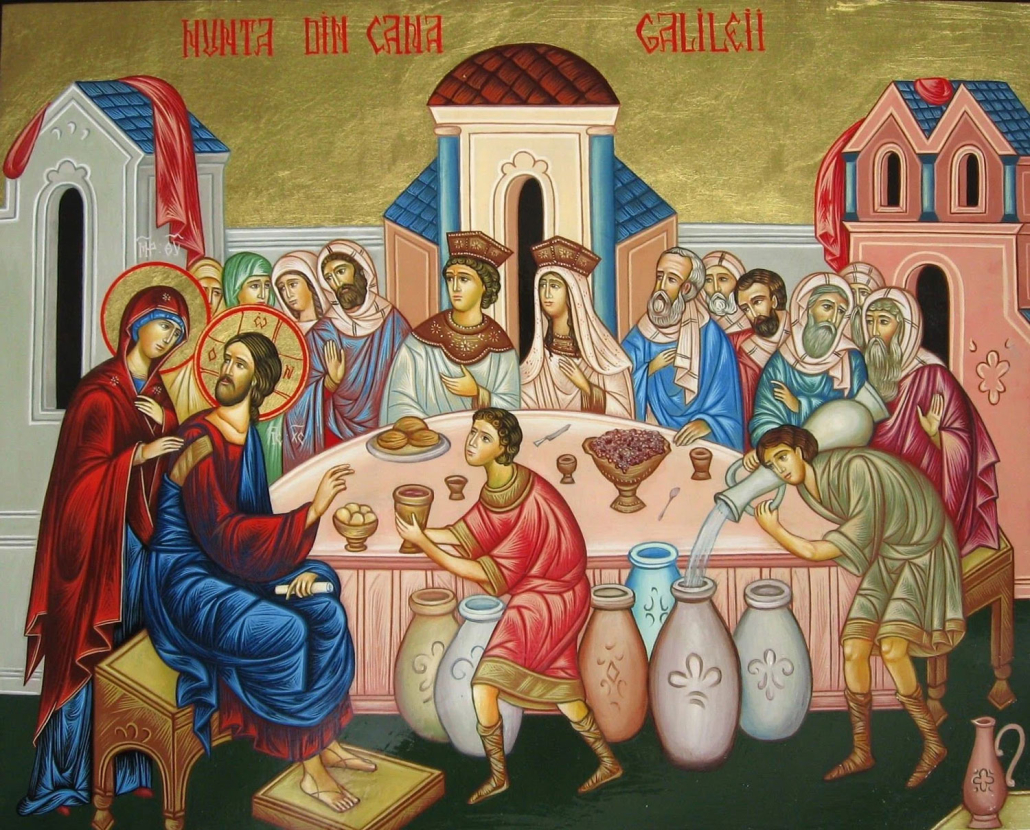Image: Orthodox Icon of the Wedding at Cana.
‘The first of seven signs’
Andrew Collis
Epiphany 2, Year C
Isaiah 62:1-5; John 2:1-11
With respect to texts such as John 2:1-11, it is tempting to read an account of magic – a magician’s trick – turning water into wine.
It is tempting to succumb to the desire for magic – a desire to be free of the real world, a fantasy about a superpower intervening to relieve us of finitude and mortality, to suspend bodily and natural laws. By the waving of a hand or wand.
Belief in magic distorts real life and leaves us holding the straw of illusions when we come back to the prose of our senses.
So, then, what is true religion? What is the alternative to belief in magic?
We might begin by reading John 2 as a miracle story (the first of seven signs or epiphanies – culminating in resurrection, anastasis). Teaching us something about our real life, even as it occurs in poetic space.
Something about revolution – Mary aware of her son’s vocation among the oppressed and afflicted, his vulnerabilities and his fears. A mother’s commitment, wisdom. She knows/anticipates the cost of public service, public scrutiny, public ministry. According to John, Jesus will next confront the unholy alliance of spiritual and colonial powers – overturning the tables of the moneychangers in the temple.
Something about safeguarding the social standing of newly married hosts – overturning disgrace, the shame of running out of wine … ensuring the happiness of wedding guests.
Something about liberation. Moses turned the water into blood – early in the story of God’s people set free. Jesus turns the water into wine – connoting freedom and joy, abundant life, the fulfilment of biblical promises: the story/song of God and humanity (the beloved, the bride, the church) united in love … the story/song of God and creation/country united in love …
We might ask after the miraculous event harboured inside the literal narrative of “water into wine”.
What is the deeply incarnate event this story contains yet cannot contain? How does this story astonish us and make our lives new? How does it give us hope where there was despair? Love where there was indifference? Companionship where there was only solitude?
How does this story portray the life-transforming character of a kindom of peace and forgiveness – the prophet Amos said that when the Messiah came there would be great harvests of wheat and grapes, and that the hills would distil wine (of course, the land produces miraculously every day, and only by God’s care and power do these things come about).
If not an account of magic, then what shall we say this story means? If a sign, then of what significance for the way we actually live our lives together in the world?
Here’s a possibility. An imaginative and sacramental reading (in no small way inspired by the example of Cana Communities for whom this is an emblematic gospel).
The water is us. The water of our humanity is changed into the wine of Christ/a – that thoroughly unselfish love we imbibe to envision a happiness, and a cause for celebration, we could never have generated for ourselves.
The miracle is that we might come – despite violence, bitterness and feebleness – to believe in ourselves as bearers of love.
The miracle is our becoming, with Jesus, the wine of a kindom of peace and forgiveness – a community, a family, a home in which the wine served last is better than the wine served first – the love of tomorrow sweeter and finer than the love of today.
So, revolution, overturning disgrace, liberation … To grasp and to cherish this good news. Our transformation as Christ’s body and blood. Our becoming bearers of love. This week, this season of change, grief, opportunity, restoration …
And the love of tomorrow sweeter and finer than the love of today. May it be so. Amen.




